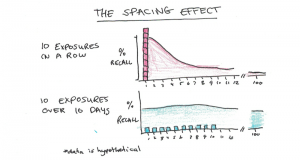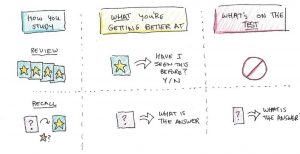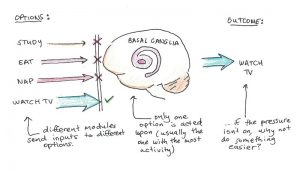
Have you heard of the “cramming myth”? That last-minute studying can miraculously help them memorize vast amounts of information just before an exam.
Indeed, many students today are firm believers of this ideal, trusting in their ability to process knowledge when they put their mind to it.
Why would you take the painful road of studying for months, if you could take the easier way out and jam everything in a few days before your finals?
How true is this myth? Today, we’re here to find out what exactly happens when you cram your studies!
Is Cramming Actually Effective?

[Freepik]
Let’s get down to the meat of the myth.
Is it really effective? Can cramming really help you memorise better before the dreaded exam day?
Well… Yes and no.
Yes — Short-Term Benefits
Surprising, isn’t it?
If you cram a bunch of information right before a test, you find yourself being able to remember those equations for a day or two. This can sometimes help you scrape by in classes that you would otherwise fail. The offer of saving students in an impending time crunch is a clutch factor that students may need to reach an academic milestone.
Pretty good, if you’re just trying to get some extra marks in!
No — Drawbacks in the Long-Term
That said, don’t take this as a secret hint to cram more right before the test.
While cramming may provide a temporary boost in memorization, its effectiveness is limited and often short-lived. The knowledge you cram is quickly forgotten, leaving you even further behind when the next class rolls around.
This is because you are only giving your brain shallow understanding and superficial retention of material. This makes cramming an overall unreliable method for long-term learning.
Why is Cramming Actually Counterproductive?
To elaborate more on why cramming is actually harmful to the progression of your academics, let’s break it down to science.
The Spacing Effect

[scotthyoung]
There is something called the spacing effect.
It suggests that spread out studying improves retention long-term.
To draw reference to the graph, one hour each day over ten days is far more valuable in retention as compared to ten hours in a day.
Absorbing Knowledge Inefficiently

[scotthyoung]
Cramming schedules usually necessitates inefficient studying strategies (and possibly losing sleep). What do we mean by this?
We’ve all been there – studying relentlessly for days on end till we’re exhausted.
Naturally, we start gravitating towards easier studying activities when cramming, even if they aren’t as effective for our learning goals. One such strategy is simply reviewing our notes, repeatedly reading them until we feel like we’ve memorized everything.
Here’s the catch: this strategy doesn’t work very well. When it comes time to actually be tested on the information, we need to retrieve it from our brains. However, reviewing only helps us recognize the information, rather than practice retrieving it. As a result, when the test arrives, we haven’t actually developed the necessary skills to perform well.
This is especially true for mathematics and sciences!
But it gets even worse. Due to a cognitive quirk, we often feel like we know the material because each time we review, we become better at recognizing it. The problem is that we struggle to use that knowledge effectively during the exam.
It’s like bringing an encyclopedia of ocean life to a fishing competition. Exams aren’t as easy as trivia quizzes! You gotta’ learn how to fish!
Thus, these strategies from cramming sessions often lead to the familiar frustration of feeling like we knew the information, but blaming the test for being unfair or freezing up during it. In reality, the test was fair, and we didn’t freeze. We simply didn’t study in a way that prepared us properly.
The Real Question: Why Do Students Do It?

[scotthyoung]
The reason you or your peers may feel an inclination to cram your studies, may not be due to any perceived cognitive benefits, but rather an emotional one.
Simply put. You don’t enjoy studying! A common sentiment shared among many students, which is why cramming tends to be a default behavior for most of us.
Initially, it’s easy to procrastinate or avoid studying when the consequences of failure seem distant. However, as the deadline approaches, the fear of failure becomes more overwhelming, overpowering the short-term dislike of studying.
Consider a simple model involving the “basal ganglia”, an internal structure that mediates decision-making. Different parts of the brain “vote” for various actions, such as studying, slacking off, eating, or sleeping.
The basal ganglia ultimately selects the option with the strongest activation based on environmental cues, innate preferences, and reinforced habits.
Imagine you have a certain level of motivation to study, driven by factors like achievement, fear of failure, or intrinsic interest. Simultaneously, there is an aversion to studying, stemming from a desire to avoid mental effort, fear of making mistakes, or simply boredom.
Studying only occurs when motivation outweighs aversion. If aversion is stronger than motivation, you tend to engage in procrastination activities instead.
When the semester begins, don’t you feel your motivation at an all time low? With exams still far away, you may not feel the fear of failure and the motivation to succeed as much.
As time progresses, the fear of failure intensifies until motivation finally surpasses aversion, prompting you to start studying. Unfortunately, by this point, it may be too late. The fear of failure leads to increased studying, even though the effectiveness of your methods diminishes.
This is how cramming came to be.
The Effects of Cramming on the Mind

[Freepik]
We’re not done with the scares!
Overloading yourself with information in a short period through cramming can also lead to mental exhaustion, stress, and reduced cognitive performance. The brain needs time to process and consolidate information naturally. Trying to cram too much can overwhelm the brain’s capacity. This is why students who only pursue last-minute studies are often moody and unapproachable.
How Do I Make The Best Out of a Cramming Session?

[iStock / Ponomariova_Maria]
But of course, not everyone has the luxury to take the high road of starting early. Perhaps there are external circumstances or simply laziness, but you find yourself in a time crunch. Knowing full well of the risks that cramming can bring you, here is how you make the best out of your predicament?
Productive Learning
1) Time Management: Prioritise the most important topics and allocate time accordingly to ensure adequate coverage.
2) Active Learning Strategies: Engage in activities such as summarising of information, teaching concepts to others, or creating mnemonic devices to enhance understanding and retention.
3) Prioritizing Key Concepts: Identify the essential concepts that are likely to appear on the exam and focus your efforts on understanding them thoroughly.
4) Strategic Review: Optimize your limited time by reviewing summaries, practice questions, and key points rather than attempting to relearn everything from scratch.
5) Utilizing Resources: Make use of available resources such as textbooks, online materials, lecture notes, and study guides to streamline your last-minute studying. Use them strategically to reinforce key concepts and fill gaps in your understanding.
Monitoring Mental Health
6) Avoiding Burnout: Take short breaks during your cramming sessions to rest and recharge your brain. Avoid pushing yourself to the point of exhaustion, as it can hinder your ability to retain information effectively.
7) Mindset Matters: Maintain a positive mindset and believe in your ability to grasp and retain the necessary information. Avoid unnecessary stress and anxiety, as they can impede your learning process.
Conclusion

[Freepik]
While cramming may offer a temporary solution in times of urgency, it is not an ideal or sustainable approach to effective studying. The cramming myth, which suggests that last-minute studying can lead to successful outcomes, is clearly debunked by acknowledging the limitations of cramming.
The first step of improving academically is to acknowledge the root of the issue.
“Am I really putting in enough effort for my grades?”
As a student, studying is your responsibility! Recognise the importance of developing long-term study habits instead of relying on crutches. In short, don’t study simply for the sake of studying!
Learning is a privilege granted to us, and we as part of the future generation should absorb as much as we can, while we still can. After all, with age comes a growing inability to learn as well as we can during our youth.
With that, we wish you the best of luck for your exams, student! Cram well, if you need to, but make sure it’s your last time doing so!
